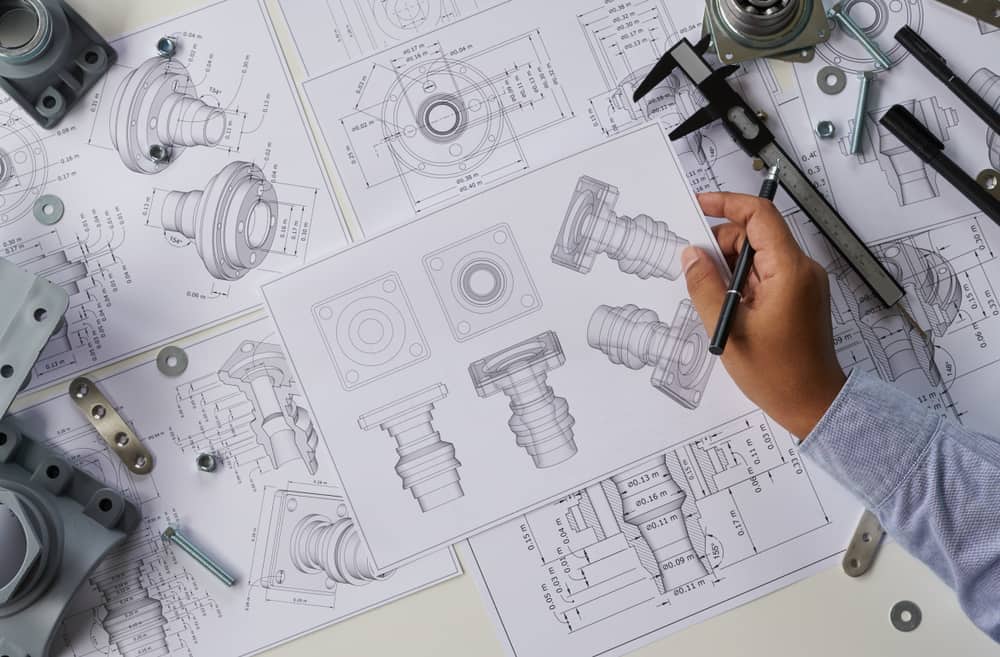
When you start studying to be an engineer, you may find yourself wondering what engineers are doing. When looking at mechanical engineering, it can be pretty overwhelming when you have to choose what you will specialize in once you have your degree.
The most common type of job for mechanical engineers is just being mechanical engineers in a production line. Mechanical engineers can also be maintenance engineers, aerospace engineers, CAD technicians, or mining engineers, as the field is required in most engineering positions.
The field of mechanical engineering is genuinely so large that you can do almost anything once you have the degree. Understanding where you may be most needed and where you are most likely to be paid a much larger salary is essential, with some mechanical engineers never needing to build anything at all.
What are the Most Popular Jobs for Mechanical Engineers?
Now that you know the basics of what jobs mechanical engineers are doing, we need to look at the specifics. We have taken a look at the most common jobs that mechanical engineers are doing and condensed them into this list; each one has a different way of relying on the mechanical engineering degree.
We have seven different companies using mechanical engineers in many odd and special ways, with every experienced engineer all having other specialties. You may often find that once you have chosen your career direction, the wide field of mechanical engineering becomes much more specified.
Mechanical Engineer

When you want to be a mechanical engineer, you are working in an industry designing power-producing machines. This can be anything from working in a power plant, working on cars, or even just designing home power systems connected to the motor.
Generally speaking, if you are a general mechanical engineer, it means that you will not have chosen a specific industry to have specialized in. This means that you have been trained to do most things that other mechanical engineers may do, including designing, manufacturing, or working on engines.
Maintenance Engineer

A maintenance engineer is often a mechanical engineer specializing in repairing older systems and optimizing the equipment and procedures used. Many general mechanical engineers become maintenance engineers once they have worked on specific systems or facilities for a long time.
However, there are specialized maintenance engineers that have more than just a mechanical engineering degree. These specialists focus on improving systems overall and making them as efficient as possible while also creating new solutions to industries’ challenges.
Aerospace Engineer

Some of the most specialized types of mechanical engineers work as aerospace engineers, owing to the extra classes that would need to be taken. You will have to specialize while studying for your normal mechanical engineering degree when going into this industry.
Engineers that work in this industry most often have had classes in aerodynamics and a few other classes to prepare them. Requiring special licenses and hands-on training to understand how to work on planes and design new ones, with most working in an office environment once qualified instead of building the planes.
CAD Technician

Contrary to what many people online may have said in the past, becoming someone that works on CAD software all the time is not as easy as it may seem. Instead, a fundamental understanding and ability to draw is needed to use CAD software to its full potential.
CAD technicians who work on the large mechanical structure, intricate tooling, or small modeling will usually also have a mechanical engineering degree. To fully understand what will be needed, you will have to focus on what type of CAD technician you want to be, as most mechanical engineers need to have CAD skills.
Nuclear Engineer

Despite what many people seem to think, nuclear engineering is a subfield of mechanical engineering and several other fields. Most nuclear reactor facilities require that mechanical engineers build it, maintain it, and then optimize it as it starts aging.
However, as an aerospace engineer, you will have to specialize quite early on in your degree to be a nuclear engineer. Requires that you take several extra materials classes to understand the process, eventually going into a specialized area of study after getting your degree.
Mining Engineer

First, it needs to be understood that there are many types of mines, and depending on where you are in the world, your specialty may differ. Many first-world countries focus on automation in their mining, while others might focus on open-pit mining.
Mechanical engineers are one of the most important parts of any mining operation as they are used for the initial design, the first time something is dug, and for maintaining everything. When you enter the industry, you may be asked to specialize or become a jack of all trades in a mine.
Biomedical Engineer

This profession has a tinge of medicine to it, requiring further study in biology to be done properly. However, it can be a more rewarding and interesting branch of mechanical engineering that people can enjoy, with biomedical not strictly organic engineering.
When you specialize in this field, you may be tasked with creating robotic hands or hip replacement joints better than the current options. However, you may also specialize in creating organic solutions, with emerging sciences allowing for cell-based engineering.
What Are Some Of The Unknown Jobs For Mechanical Engineers?
If you have been thinking about becoming a mechanical engineer, you may already know about the most common jobs that you can do. This is why it is important to look at some less well-known jobs, which are usually because people do not know that these are mechanical engineers.
The field is known for being active in every facet of life while usually being in the background of the average person. This means that there is always some job that you can be doing and that you may indeed be able to find a niche part of the engineering field that you can fall deeply in love with.
Acoustic Engineer

Acoustic engineers are some of the most underappreciated engineering fields that you can find being used everywhere. This is because from stages to boardrooms, acoustic engineers specialize in the ability of a room to either have great sound or to not have any sound inside it at all.
You will often find work as a sound engineer, which is a part of mechanical engineering using sound and speakers. However, you may enter this mechanical engineering field without getting a mechanical engineering degree owing to specialized schools that focus on it.
Control Systems

A combination of several types of engineering, control systems refers to anything from the systems that control traffic lights to control systems of power plants. Everything needs some control system, and mechanical engineers are often at the heart of the building, implementing and maintaining them.
When you have your mechanical engineering degree, you may want to look into this engineering field simply because of the diverse possibilities. You will often enter the area at the bottom level and quickly work your way up to a senior position because only you know how everything works.
Robotics

One of the most misunderstood parts of technology has been that electrical engineers and no one else does robotics. However, most of the complex robotics systems in the world are built by mechanical engineers, owing to robotics is a combination of all things that mechanical engineers know.
Modern mechanical engineering involves programming, electrical systems, hydraulics, and mechanical systems. This usually means that a freshly graduated mechanical engineer understands more about robotics than an electrical engineer who may only have learned about electronics.
Nanotechnology

One of the emerging fields of engineering in the field of nanotechnology, which is using the basic principles of engineering but on a nano level. Many advancements in medicine and treatments are being made because of mechanical vehicles that have been made extremely small.
Nanotechnology will require that you further study after having received your mechanical engineering degree to work on required levels. Most of the time, you will have to go into the industry ready to learn a lot more than you already know, thanks to how new everything still is.
Which Jobs For Mechanical Engineers Can Pay The Most?
Knowing which mechanical engineer jobs are available is not the same as knowing which jobs will pay the most. Many times, there are jobs in the field that are not competitive with the others that you may be able to do, which is why it is important to know which three jobs can pay the most.
Mechanical engineers rarely go into the field purely because they are looking to become as rich as possible. However, it is not always possible to ignore which jobs may pay you more than just a comfortable living wage, with many mechanical engineers finding their passion is what also pays the most.
Automation Engineer

On average, in the United States, an automation engineer gets an annual salary of around $90 024, which is not at all accurate to how much you may be paid. Usually, the entry-level job brings down the average by a significant amount, which means the top end is much more than the average.
Automation engineers focus on building machines and operations that do not need a lot of operators to use. Anything from packing machines to CNC machines with robotic hands falls into the field of automation engineers, which means that the opportunities are endless.
Powertrain Engineer

One of the highest-paid engineers is a powertrain engineer, earning a national average of around $102 363 per year. This means that even on the low end, these engineers are paid significantly more than others; however, the work is much more intense than others.
Powertrain engineers are tasked with improving the appearance and performance of engines, whether it is an electrical engine or traditional combustion. Usually employed in the automotive industry, specialists may work at Bosch or other places that supply motors and engines.
Instrumentation Engineer

An instrumentation engineer is part of the field of control systems and is one of the highest-paying mechanical engineer jobs that you may do. With an average salary of $107 881 per year in the US, specialists are highly sought after worldwide, owing to few engineers choosing the field.
An instrumentation engineer specializes in equipment that monitors and control systems, designing, building, and testing equipment that control other equipment. Employed in anything from power stations to TV stations, these engineers are usually never seen but are responsible for keeping everything going.
What Kind of Degree Do You Need to be a Mechanical Engineer?

To put it simply, you will need a degree in mechanical engineering, which is a four-year degree that is only available at a university. Usually, a bachelor’s degree does not specialize in any of the fields, with post-graduate degrees, master’s degrees, and PHDs being specialized.
Most often, you will only be able to specialize once you have completed your initial degree in mechanical engineering. However, universities and courses specializing in specific areas or specialties will focus on different classes while studying for your mechanical engineering degree.
Suppose you want to be a mechanical engineer; you will have to study some of the toughest courses available in any university. With only specialized courses requiring more complicated classes, with most mechanical engineers never just getting one degree.
What’s the Average Salary for a Mechanical Engineer?

Knowing what to study and where to study is not always enough to get more people interested in the field, with a deeper look into salary expectations being important. You will often have to spend several lifetimes’ worth of money to study at a university when living in the US.
For this reason, it is important to look at what the entry-level mechanical engineer will be getting compared to the top 10% of the field. This gives a deeper look at your salary expectations when you are just entering a field of work you have studied for four years.
Entry-Level Engineers
An entry-level mechanical engineer usually earns around $63 527 per annum, which means the monthly take-home is about $5 293 before taxes. This is a significantly larger amount than most other professions, which can drive many people towards the field initially.
However, if you are experienced or have become a specialist, this increases drastically, which is why many people choose a field that interests them. You may find that many Ph.D. holders have also continued studying specifically to stave off having to pay their student debt.
Experienced Engineers
An experienced mechanical engineer started earning a lot more than most other professions; however, this salary depends heavily on where you work and how long. On average, you may earn $95 560 per annum, which is $7963 per month before tax deductions.
However, you need to remember that your specialty and the company you are working for will heavily determine how much you are earning. There is a reason that many mechanical engineers are either hooping from one job to the next or are working at one company for their entire lives.
The Top Level
Knowing what the top-level mechanical engineers earn can be extremely difficult to calculate, owing to how secretive top earners usually are. From what we can tell, the top ten percent makes around $141 060 per annum, which is $11 755 per month before tax deductions.
However, many top earners in the mechanical engineering field may be earning triple this amount because of their skills. Further, top-earning mechanical engineers often have their own companies to make several million if it is successful.
Are Mechanical Engineers in Demand?

Yes, mechanical engineers are in demand and will always be in demand, owing to the wide range of specialties that the field is connected with. You may often find that no other engineering position is being offered at a company other than mechanical engineers.
Usually, this is because mechanical engineers can branch out into some of the other engineering fields. The initial training in the degree focuses on electrical engineering and some structural engineering, which can cause mechanical engineers to help in other areas.
Demand for mechanical engineers is only low in areas where suburban and white-collar jobs are in higher demand. However, it should be noted that even in areas where tech or office jobs are much more common, mechanical engineers will be working behind the scenes to keep everything going.
What are the Disadvantages of Being a Mechanical Engineer?

While working as a mechanical engineer will ensure that you always have a job and be paid relatively well, there are a few disadvantages to the field. It is important to know these before going and dedicating your entire life to something that may not be for you.
We recommend that you take a look at each of the disadvantages and make the decision that you know you will be capable of supporting. Many people have made the mistake of choosing mechanical engineering and not liking the field once they have their degree.
Educational Requirements
The biggest barrier that many people face when thinking about becoming a mechanical engineer is the educational requirements. Even entering a college course that prepares you for university courses can have hefty requirements set before you.
This means that you will have to have some of the best grades in your class to ensure that you can always keep up with the mathematics being used. One of the reasons so many people fail out of engineering school is that they cannot get the required grades to continue.
Licensing Requirements
While not always necessary, some of the specialist fields of mechanical engineering will require that you do yearly exams to keep your license. This is often for the nuclear industry or an industry that works with food, water, or anything else that causes death when not done properly.
Most of the time, you will be able to take these tests, and the company you are working with will pay for them. However, it will require that you continue to study for your entire life while also taking tests regularly to ensure that you are capable of doing everything required in your field.
Constant Travelling
If you are hired for your entire life at one company, the chances are that you will never move out of the one city you are working in. However, many engineering jobs require you to travel regularly, which means you spend very little time at home with your family.
This may sound easy when you are young but becomes a problem as you start aging and want to set down some roots. Further, you may have to travel to new cities as a new job become available to you, which means uprooting your entire life each time you get a higher-paying job somewhere else.
Conclusion

Mechanical engineers seem easy to understand but, in reality, are working on almost everything we are using each day. With the job opportunities always being endless, you can be sure that you will find something that not only interests you but pays extremely well.
Whatever you do, don’t think you can become a mechanical engineer with a half-hearted effort.
References:
Michigan Technological University: What is Mechanical Engineering?
Study Abroad Nations: 10 Best Types of Mechanical Engineering Jobs Currently
Career Karma: Engineering Careers: 33 Types of Engineers and Salaries
InfoBloom: What are the Different Types of Jobs for Mechanical Engineers?
Indeed: Highest-Paying Mechanical Engineering Jobs: Mechanical Engineer Salary Information
SAIMechE: A Career in Mechanical Engineering
